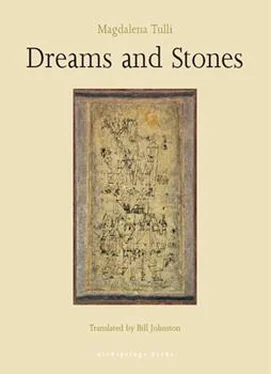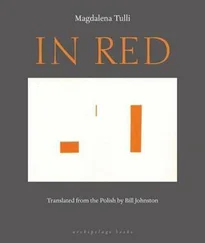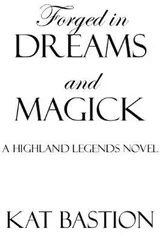The inhabitants of the city might well envy the stones their freedom, if they were capable of perceiving it. Yet they too, though they do not know it and do not wish to, besides the ephemeral life of their bodies and minds, contain within themselves the indestructible life of stones. Whereas that which they themselves call their life turns out to be a fever eating away at their thoughts, which are tormented by the perpetual movements of sand, the powerlessness of clay, and the troubling plash of water. The inhabitants of the city want nothing to do with the life of stones, the only life that is in fact given to them. They are repelled by the stony calm of walls, and especially the certainty of the stone hand, which never trembles; by the firmness of features that never know sorrow and by the cold indifference of the monolith. The world of silence that endures inside the stones and the bricks, a world devoid of thoughts, feelings or desires, astounds and frightens them. And life without desires seems even more unbearable than the life without fulfillments that is experienced every day by many an inhabitant of the city.
Stupefied by the muddle of signs covering the walls, they miss the questions that dwell within the walls themselves. Those to which any answer is sufficient yet that nevertheless must remain unanswered, since they are stacked upon one another, forever joined by the cement of convictions. The answers to the questions that appear in the posters are attached to them with string, like a label on an item for sale secured additionally by a lead seal. The greatest number of questions are imprisoned within a desire. They ride up and down, like an elevator rattling the cage of its shaft. Or they roll along between two sidewalks like an abandoned ball, bouncing first one way then another, ever more slowly. Those that are light as down float in the air and are blown away on the wind. Everywhere there are multitudes of them, though no one needs them. But there is a shortage of questions that easily cut through space in search of answers. The city built of questions that have lost their momentum, and of routine answers, contains nothing that surprises or captures the attention. It is obvious that memory has nothing to latch on to here.
Each route is driven by trams bearing now one number, now another. In the middle of the street there suddenly appears a scrap-metal warehouse with boarded-up windows. It sometimes happens that the same place cannot be found twice, because the layout of streets has changed overnight. An elegant passage may suddenly become a foul-smelling blind alley; a luxury hotel will turn into a homeless shelter. This city is so dislocated that its Paris — a place about which all that is known is that they cannot make silk purses out of sows’ ears there — has been transformed into a trash heap combed by hobos. An old umbrella with twisted spokes juts from it instead of the Eiffel Tower.
But in a city like this, even if it were made of gold and platinum and encrusted with diamonds, every precious building would still be merely a repository of disquiet; columns of wrongly posed questions would support arches of unserviceable answers and every door, without exception, could turn out to be the worst possible exit. And even if the city were constructed entirely of brand-new bricks and fresh plaster, pipes without a trace of rust, spotless windows and sidewalks glistening like mirrors, it would still remain a cage and a prison.
Like the countless reflections of an invisible dust mote in a kaleidoscope, there will multiply the numbers of Left Bank Parisian bistros in which girls in low-cut dresses lean over cups of black coffee with French novels in their hand. Red lightbulbs will shine over a street corner evidently detached from the Soho district of London, with garishly lit signs in English. In place of the pissoirs there appears a smoke-filled pub in which Irish poets drink, sing and play darts, while fanatical terrorists in army jackets plant time bombs. The place of the post office is taken by a New York drugstore where at four in the morning a pale theater critic suffering from a migraine will call in for sleeping pills. In the closed-down stocking repair shop there can be found a Palermo ice cream parlor in which taciturn men in shades will stare for hours at the glass door, pistols thrust beneath their jackets. At the newspaper kiosk brightly colored paper lanterns will light up while inside there will appear long rows of tables covered with tablecloths, on which dishes of snake and monkey meat will be served. Forever trapped in this city and occupying within it less space than a bookmark, Palermo, Belfast and Hong Kong also go to rack and ruin, and fragments of them are found in ever different and more unexpected places.
Names also ebb away. Erosion has polished the letters; some it has crumbled and scattered. Those that remain no longer have any substance. It is a pity that the name vanishes. Yet could it be as beautiful as it is if it did not disintegrate from one moment to the next? When there are no letters there is no city. For only they were something certain in the chaos of dates, events and imaginings. Only they encompassed that which could not be encompassed: joyous First of May parades, and the forgotten helicopters of the municipal transit system, which from having flown for so long without fuel have also shrunk and apparently now hover low over the ground in the botanical gardens in the guise of dragonflies.
A rickety enclosure made from a handful of letters, amongst which there jut out the spikes of W s and A s, now has to contain air-conditioned American banks, cruel and ruthless arms dealers, illegal manufacturers of heroin who shoot at the police from behind chewing-gum kiosks, shivering Gypsies squatting on the sidewalks, and Asian women selling French perfumes on the street directly from suitcases. It may be that at some point supercilious Cossacks in armored personnel carriers will surround the city’s central intersection, or that the savage hordes of Genghis Khan will pitch their tents and build campfires along the main thoroughfare, blocking the way for the trams and buses full of people on their way to work. It may be that Tartar warriors will start slaying passersby with blows of their spiked clubs. But they too will be unable to prevent the collapse of the whole.
There is no one who might know what to do with the damaged construction. It has become clear that the polishing of floors, the cleaning of sidewalks, the spraying of water on the asphalt on hot days or even the painting of walls with oil paint — none of this was sufficient; but the inhabitants of the city did not know how to do more. Disheartened they neglect their duties, which are of an ancillary nature and of little significance. The essence of the city was and remains incomprehensible; if the city planners had some vision of it they kept it to themselves, perhaps in the hope that this knowledge would never be needed. The inhabitants of the city know how to repair only that which can be touched. They are unable to touch that which cannot be seen and yet is most impaired, and that which has an indirect influence on the condition of the whole, since it controls the flow of nouns, adjectives, verbs, affirmative and negative sentences. The true indicators of urban solutions are the utterly unknown rules of joining sentences and creating stories, the principles of linking ideas with other ideas and of assigning weight to questions and answers.
In the current state of affairs streams of groundwaters, strata of clay, and sandbanks are a constant threat to the city. If purity is to be maintained in the enclosed region of happiness that the city was meant to be — this bastion of order holding back the stormy ocean of chaos — then sentences and stories must be removed to the outside day and night, as is done by the municipal sewers, so that in the city there should not remain a speck of dust, not a puddle, not an ounce of trash on the squared paper of the sidewalk. Even words need to be removed. But then that which remained in the city would be dispersed in a single instant in the waters of the countercity, like a flotilla of ships that have lost their anchors.
Читать дальше












